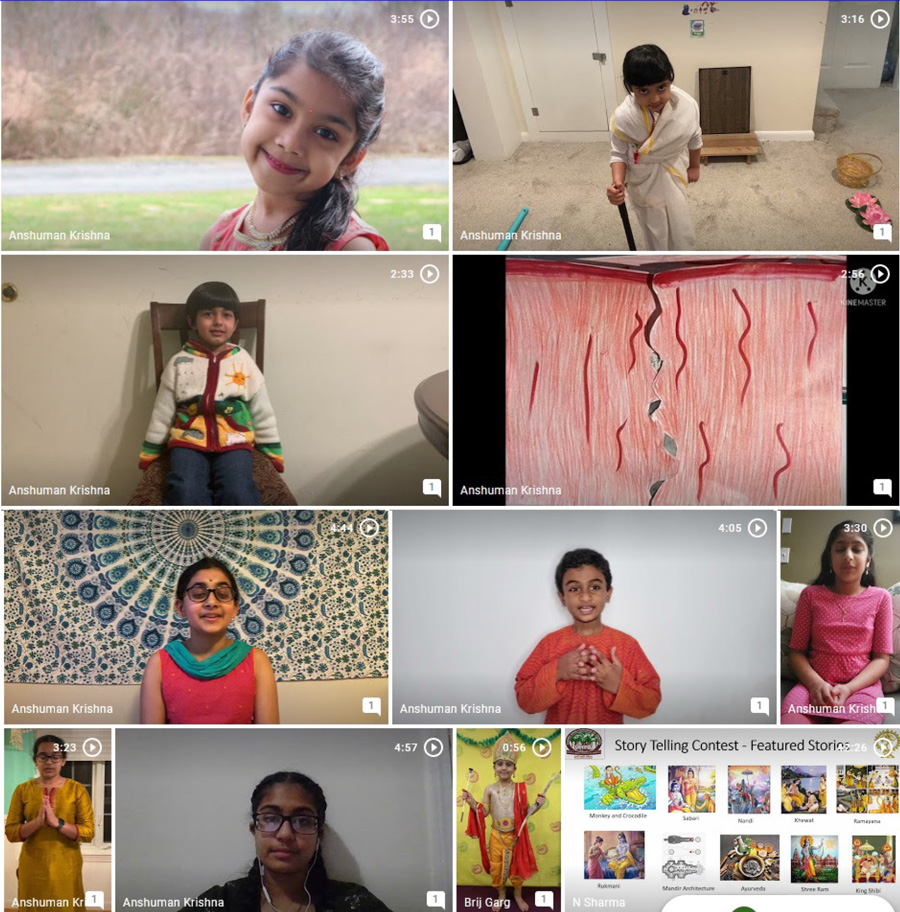Hindu Women’s Network (HWN), a project of World Hindu Council of America (VHPA), has been a seamless accompaniment to the standards of VHPA based on the timeless values of Prachar, Seva, Samskar, and Sampark. Right from their unique Women’s Day events, timely and critical assistance for Hindu women as needed, donation drives, fundraisers, and marathons throughout the year. This year, the newly introduced HWN Book Club delves into the deep questions of purpose, culture, and Hindu Dharma-related and Dharma-based themes, discussing service and community key themes in every human’s life and the challenges we face in today’s technological age. The HWN Book Club members have dedicatedly participated in regular book club meetings to facilitate discussion and healthy debate.
While the HWN Book Club has been an informative and engaging experience for all the participants, when the Book Club decided to have the June meeting dedicated to the three successful and eminent authors visiting our beautiful city of Atlanta, they had no idea how much of a big, roaring, humungous success this month’s book club session was going to be. The focus of the wonderfully curated program was to discuss the selected Dharma-related books that would open your mind and heart to learning more about the historical aspects of our religion, and how Dharma and reading about it embodies valuable teachings that can make us more aware and bring more cultural insight into our lives.

This month’s HWN Book Club discussion was held on June 19th, 2024, at Sankranti restaurant in Atlanta. It hosted three authors who are well revered by fans and admirers worldwide.
Ms. Ami Ganatra, Author of Ramayana Unraveled and Mahabharata Unraveled I & Mahabharata Unraveled II;
Mrs. Mitra Desai, Author of Flag of Ananta, Shitala—How Bharat Enabled Vaccination;
Shri Shivprasad Mantri, Author of Chhatrapati Shivaji Maharaj: Biography and Learning, Bajirao Peshwa.
It was a wonderfully enlightening session that encouraged readers and budding authors to have a personal writing goal. One of the recommendations was to practice mindfulness to what we read. Mindfulness can be practiced in daily routines and chores as we walk and talk. So, why not when we read? Even though none of us are experts in the material we read, we read in the first place to gain new knowledge. The HWN Book Club was made to foray into our investigation into the material we are reading and learn from each other in a safe and secure environment that encourages sharing ideas in a Hindu culture-based discussion. The meeting with the three authors was very educational in the context of thinking on your own and practicing authenticity as you read. The authors encouraged everyone to pay attention to individual likes and dislikes, and what one may gloss over. As you become aware of the feeling tones associated with the material, you can be mindful of how your mind processes thoughts about the ideas expressed and what thoughts or emotions arise? What stories do you tell yourself? What images about the book do you recall? The authors encouraged the HWN Book Club and audience members to bring their mindfulness practice to what they read in the book club. It can be another doorway to watching how you delve deeper into Hindu Dharma and study our culture, including its historical aspects. Whatever resonated with you and stood out for you teaches you about yourself. When you reflect on the above, what can you learn from this book? Can you think of ways to translate these practical lessons into your life?
Ami Ganatra is an alumnus of the Indian Institute of Management, Ahmedabad (IIMA), a certified yoga teacher and regular yoga practitioner, and considers herself a student of Sanskrit and Bhartiya knowledge systems. Ganatra realized, while reading a book she thought would give her more knowledge of yoga poses, that there is so much about our ancient Bhartiya wisdom that we are not knowledgeable about. Over time, Mahabharat and Ramayan were the two books that made her think that it was assumed that our history was written by victors and only by people who won. Discussing Dharma with a friend made her wonder if our historians, Rishis and Munis, needed clarification. Women in mythology were generally portrayed as oppressed. It was through various perspectives, so what text could she read rather than someone’s perspective? She wanted to know the truth from the original texts and learned Sanskrit. She also wanted to write about values that are valid today. What was the original text saying exactly? We are happy to assume things without questioning them. She encouraged us to return to the original texts, re-learn history with our perspective, and ask our assumed concepts and understanding of what was told to us in our childhood. She said: “It is okay to question what doesn’t make sense to you or what is just someone’s perspective.”
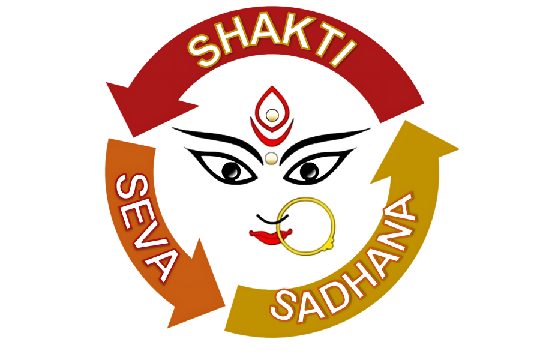
Ganatra’s written work is her thought process and is not regurgitated or re-conceptualized. She attempts to return to the historical texts and then present the story, angles, nuances, conclusions, aspects, and learnings as bite-sized nuggets of quickly understandable concepts from our historical books.
Mitra Desai is the Author of the book Shitala: How Bharat Enabled Vaccination. She hails from Canberra, Australia, and is originally from Kolhapur, Maharashtra, Bharat. She wanted to connect our historical stories with younger kids, including her young ones and began exploring the idea of writing snippets in easily comprehensible form. Mitra Ji mentioned that she is employed in the Public Service and holds a master’s degree in Criminal Justice; hence, she was new to writing books. Mitra Ji had the good fortune to touch people’s emotions due to a viral project, a meaningful collaboration with the renowned Mahabharat researcher Shri Nilesh Oak. She curated a 10-part YouTube video series on Maharishi Sushruta – The Father of Surgery, where she explained how Sushruta inherently contributed to and shaped the surgery world. This is available in both English and Marathi. Her son catapulted her into the world of writing through an unsavory incident at school where he had a project called Origins of the Universe and how each religion describes it. Mitra Ji was unhappy with how Hindu Dharma was portrayed and decided to be a stakeholder in reviewing material that schools expose kids to. Motherhood taught her to have the courage to be part of this meaningful conversation and provide answers not only to her child but also to the people around him who had unfortunate assumptions about certain aspects of Hindu Dharma. Mitra Ji believes there needs to be a purpose in writing, and that purpose will provide you the required direction to pursue your goal of becoming an author. Friends should read each other’s scholarly attempts to write and support by providing honest and critical feedback, which she hilariously described as The Red Pen.
The panel host, Mrs. Sarika Jaswani, described Mitra Ji’s other works, including her series on Bharat’s unacknowledged contribution to the First World War, a series on how Europe stole the secrets of making colored cotton from Bharat, a series on Indic Culture with noted Indologist Deepall Patwadkar, and several other interesting Indic topics. Mrs. Jaswani described Mitra Ji’s most recent endeavor, the book Shitala, as an endearing conversation between a granddaughter and her grandfather that could happen in any Bharatiya home but is relevant for humanity.
As the host of the panel discussion, Mrs. Jaswani spoke about how Mitra Ji has patiently documented colonial references that demonstrate that vaccination was a well-known and firmly established practice in Bharat long before Jenner materialized his vaccination technique. She praised Mitra Ji for taking up a complex subject, peeling back all but the critical core, and setting out the fundamental truths in a simple, understandable, and enjoyable form. The colonial plunder extends far beyond her imagination. For the first time, this story is being told from the perspective of the knowledge tradition from which it emerges.
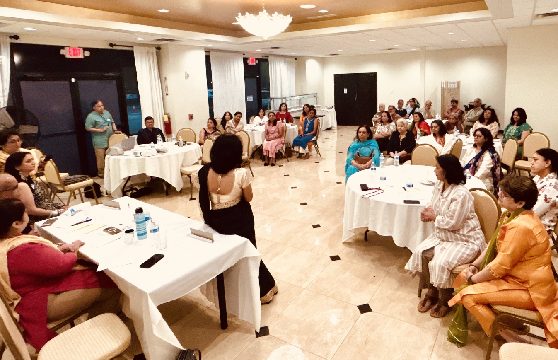
Shri Shivprasad Mantri was very informative on the stories of Chhatrapati Shivaji Maharaj and Bajirao Peshwa. Inspired by anecdotes from his childhood and management college days and an earnest suggestion to teach about Chhatrapati Shivaji Maharaj, he taught 40 management concepts that he believes and knows were deployed by Shivaji Maharaj.
Shivprasad Ji is a Mechanical Engineer who did his MDP at IIM, Ahmedabad, Bharat. He is the President of Kohinoor Group, Pune. He mentioned that the original principles of Shivaji Maharaj are still taught in management schools across the country, for example, the idea of leading from the front, putting people first, the welfare of your community, and leading by example to your team. Our case studies help us learn and validate our historical stories. The first ever documented surgical strike was by Shivaji Maharaj, and his detailed story kept the audience spellbound. What to know? What to learn? Why to know? Chhatrapati Shivaji Maharaj and Bajirao Peshwa inspired three concepts he discussed. “Hindavi Swarajya: Soul of The Modern Bharatiya Nation-State” mentions that Chhatrapati Shivaji Maharaj was the very embodiment of a born ruler typified in the great Bharatiya Epics, Shashtras and Puranas, who showed what Bharat would be, sooner or later.
The three authors encouraged the audience to indulge in immersive reading and write how they would want to read it, using simple and authentic ways of expressing their unique ideas. Writing freely and not editing as they wrote was another pearl of wisdom shared by Mitra Ji. She recommended coming back to it to edit at a later time and just writing freely without hindrance.
Words are powerful, and words matter. We should learn more in-depth about our historical scriptures, and the next generation should understand where our lineage, culture, and religion come from.
Ami Ganatra said it is essential to know why and for whom you are writing. She was told that her writing was like speaking to her readers, making her feel like she did what she had set out to do.
Criminals were once just ordinary people like us who fell prey to the five bad traits of Lust, Greed, Anger, Jealousy, and Ego. How we live a worthy life is why we value history and its lessons. Mitra Ji insisted that ” Misinformation is readily available. Technology can be a good tool if used correctly; the three authors discussed writer’s block, and if you face obstacles, be determined, focus, re-group, and take breaks to clear your mind. Write and rewrite as much as you deem appropriate until you are satisfied with that chapter.
Veena Katdare and Sarika Jaswani convened and hosted the panel of authors. The delicious food at Sankranti Restaurant was the icing on the cake, and the happy audience was so glad to meet and greet the authors. It was a wonderful learning experience for the members of the HWN Book Club and the equally eager audience.
Please consider joining the HWN Book Club, which meets over two months, with at least three discussions on a book, with one in person discussion. Each participant then creates a written or video-graphed review of the book, which will then be published on social media. Being part of the Hindu Women’s Network Book Club is an immersive, informative, and interactive experience. This June meeting left the audience wanting more, and they all look forward to the following discussion.


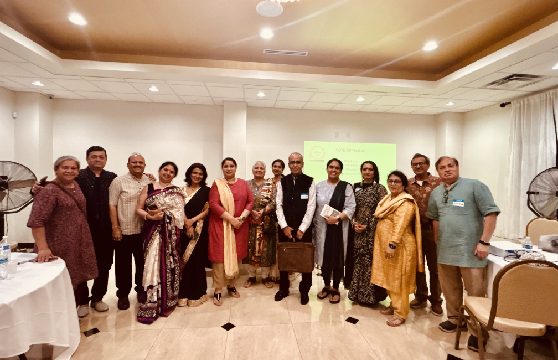
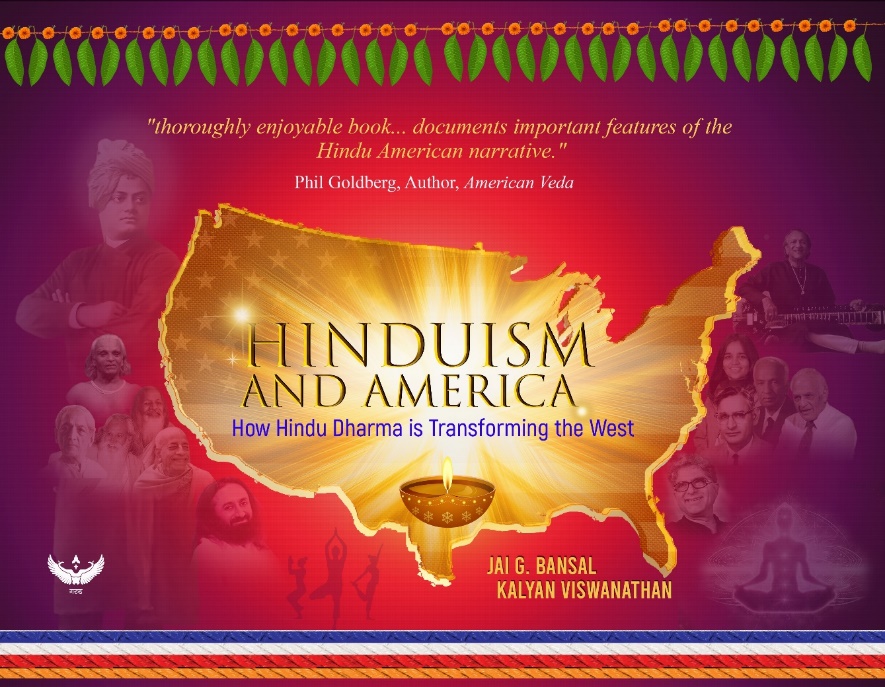
![[ India Today ] Ohio senator JD Vance thanks wife, a Hindu, for helping him find Christian faith](https://hinduvishwa.org/wp-content/uploads/2024/06/us-senator-jd-vance-reveals-how-his-hindu-wife-usha-helped-him-find-his-christian-faith-image-re-272530504-16x9_0-120x86.webp)




